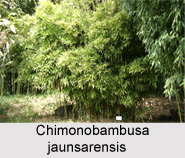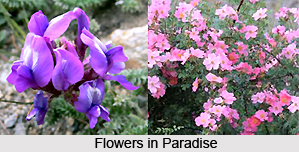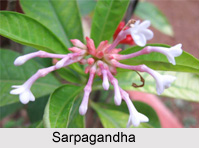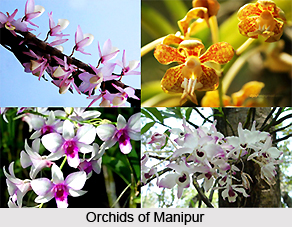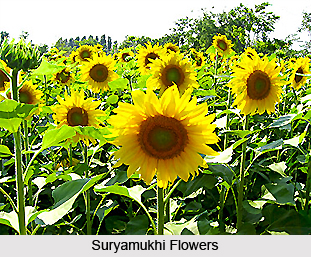 The Suryamukhi plant is known as Helianthus annuus in Botany. This plant is well admired for its beauteous flowers. The flowers are hugely popular worldwide for their fascinating gander as well for the edible oil that extracted from the seeds of the flower. Though Suryamukhi plant has earned its fame as having lovely flowers and the culinary usage of its seeds, this plant has some medicinal values and this prospect gives the plant a rise to exquisite height. This plant is popularly known as `Surajmukhi` in Bengali, `Sunflower` in English, `Surajmukhi` in Gujarati and Hindi, `Suryakanti` in Kannada, Tamil and Malyalam, `Suriyakamal` in Konkani, `Surya phul` in Marathi, `Poddatringuddachettu` in Telugu and `Surajamakkhi` in Urdu.
The Suryamukhi plant is known as Helianthus annuus in Botany. This plant is well admired for its beauteous flowers. The flowers are hugely popular worldwide for their fascinating gander as well for the edible oil that extracted from the seeds of the flower. Though Suryamukhi plant has earned its fame as having lovely flowers and the culinary usage of its seeds, this plant has some medicinal values and this prospect gives the plant a rise to exquisite height. This plant is popularly known as `Surajmukhi` in Bengali, `Sunflower` in English, `Surajmukhi` in Gujarati and Hindi, `Suryakanti` in Kannada, Tamil and Malyalam, `Suriyakamal` in Konkani, `Surya phul` in Marathi, `Poddatringuddachettu` in Telugu and `Surajamakkhi` in Urdu.
Suryamukhi plant belongs to the species that is reckoned to have originated from abroad and this plant was derived and widely cultivated thereafter. The seeds of this plant are used for an essential culinary ingredient and this plant is cultivated in some parts of India. Inhabitants of some parts of India especially village people earn their livelihood by selling the tasty seeds and edible seed oil. This is also cultivated as forage crop. Numerous horticultural varieties have been developed for the improvement of the cultivation of this particular plant considering its value as a crop, as well as a medicinal plant.
Suryamukhi plant is an annual herb with an erect, rough, hairy stem and the plant grows up to 4.5 metres in length. The leaves are 10cm to 30 cm long, alternate, long-stalked, are broadly ovate to cordate, coarsely toothed and are roughly pubescent on both surfaces. The flower heads are usually 7.5 cm to 15 cm wide. The width extends to 30 cm in some flowers due to some variations in cultivation. The ray florets of Suryamukhi are yellow and the disc florets are brownish-purple in colour. The plant bears fruits that are cylindrical, obovoid compressed, one centimeter long and 0.6 cm wide, and tinted in white, black or striped grey and black.
In Ayurveda the Suryamukhi flower is considered to be anthelmintic and antiperiodic. The extract of the plant is widely used for it is reportedly used to treat skin diseases, itching and ulcers. This plant is also effective for the treatment of certain arduous diseases like leprosy, hysteria, biliousness, asthma, bronchitis, burning sensation in the vagina, urinary discharges and anaemia. The seeds of Suryamukhi plant are diuretic and expectorant. The seeds are used to treat bronchial, laryngeal and pulmonary affections, coughs and colds. In Unani medicinal practice a decoction of the root is used to strengthen teeth and cure toothache. The leaves of Suryamukhi plant are applied to relieve lumbar pain. The Suryamukhi flowers are considered useful for treating piles, opthalmia and kidney diseases. In Siddha practice, the flowers and seeds are used to treat arthritis and dropsy. Not only in India, but also in overboard the seeds are administered in the treatment of dysentery.
